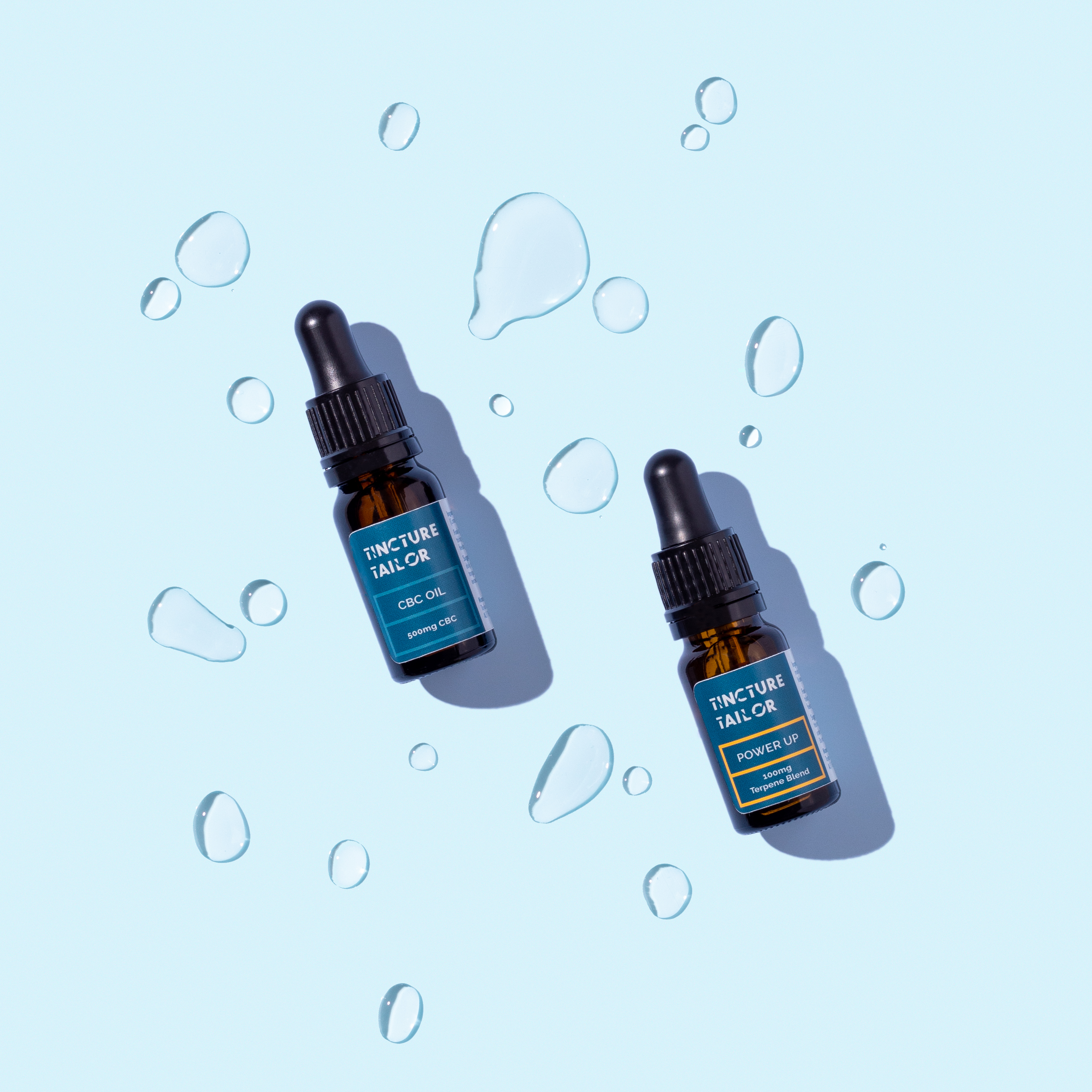We all feel a little sluggish from time to time, lack of sleep, stress and poor diet can all contribute to low energy levels and affect our cognitive function. And while another coffee or a sugary snack might feel tempting in the peak of the slump, unfortunately it may make things worse in the long run. Our brains need fuelling with the good stuff, just as much as the rest of our bodies do.
The Brain Food collection, carefully curated by the team at Tincture Tailor, has been designed to offer a natural energy boost, promoting feelings of alertness in the moment, while also supporting your long-term neuro health and cognitive function.
The package combines the neuroprotective properties of CBC, found in the brand’s 5% CBC oil, with a blend of energy boosting terpenes with uplifting properties from the Power Up tincture. These are designed to be taken alongside each other as part of a daily routine, to promote the entourage effect and help you perform to your full potential.
Cannabichromene (CBC) and brain health
We are all bound to experience dips in our energy levels from time to time, but if it’s a more regular occurrence it can have a significant impact on our motivation and productivity, as well as our overall mood and emotions. For some living with long-term health conditions, brain fog and fatigue can crop up more often and have a significant impact on the individual’s quality of life.
While cannabinoids can be powerful sleep aids and relaxants, when used in the right way they can also boost energy levels, improve focus and increase productivity, due to how they interact with the body’s endocannabinoid system.
CBC is not as well known as its counterparts, CBD and THC, but it could be a particularly effective compound for improving brain function. It works in a different way to other cannabinoids, binding to the vanilloid receptor 1 (TRPV1) and transient receptor potential ankyrin 1 (TRPA1) receptor channels in the body, which are responsible for regulating inflammation, temperature and brain health.
Perhaps for this reason, CBC is thought to have neuroprotective properties and may even be a potential therapeutic agent in the prevention and/or treatment of long-term neurodegenerative conditions such as Alzheimer’s and Parkinson’s disease [1]
An animal study from 2013, found CBC had a positive effect on neural stem progenitor cells (NSPCs), a cell essential to healthy brain function [2]. NSPCs differentiate into astroglial cells, the most important cells for maintaining brain homeostasis. Astroglial cells counteract many issues, such as oxidative stress, inflammation, toxicity, that can lead to neurological disease. [3]
The role of terpenes
Terpenes, which are naturally found in plants and are responsible for their distinct aroma and taste, also have a range of therapeutic properties to help you maintain your health and wellbeing.
The Power Up blend contains a unique formulation of terpenes which, when taken alongside CBC, will enhance its potential due to the entourage effect, as it is widely thought that the effects of the cannabis plant as a whole are greater than any of its individual parts.
Limonene
Limonene, which is commonly found in citrus fruits, is well-known for its uplifting and energising effects, which may come in handy when you’re experiencing brain fog or fatigue. [4]
Studies have also shown it to potentially elevate mood and relieve stress, which can both be affected by low energy levels, by increasing serotonin and dopamine levels in the regions of the brain that are associated with anxiety and depression. [5]
Caryophyllene
Beta Caryophyllene is another widely used terpene which has a distinct flavour, found in black pepper, basil and oregano among other plants. Unlike other terpenes its structure means it can bind to the CB2 cannabinoid receptor.
As well as boasting antioxidant [6] and anti-inflammatory [7] properties, it is thought to enhance mood and improve focus.
Pinene
Pinene is the most commonly found terpene in nature, mostly in pine and conifer trees, but also in rosemary.
It has been shown to improve cognitive function and memory, increase focus and alertness, and reduce anxiety. [8] While more research is needed, pinene has also shown some promise for those suffering from memory loss and other neurodegenerative diseases. [9]
Valencene
The terpene valencene has the aroma of sweet orange, fresh herbs, or freshly cut wood, and like limonene it is often found in cannabis strains which are known for their mood-boosting and uplifting effects.
The potential health benefits of Valencene are still being investigated, but it is thought it may have antioxidant, anti-inflammatory, and anti-allergic properties.
How to get the most out of the Brain Food range
Many people report that adding cannabinoids and terpenes to their morning routine has helped improve their energy levels and mental focus in the long run. To get the most out of the Brain Food range, we recommend taking it daily, alongside a healthy, balanced diet, made up mostly of whole-foods. The tinctures can also be utilised as a pick-me-up during those mid-afternoon slumps to save you from reaching for a sugary snack.
As with all the Tincture Tailor products, it is not one-size fits all, so it’s important to find the right dose to suit your needs. Start by taking a few drops of each tincture daily, gradually increasing your dose according to your body and your desired effects. We always recommend speaking to your doctor before making any changes to your medical care.
ENDS (901)
References
1 – Stone, NL, Murphy, AJ, England, TJ, O’Sullivan, SE. A systematic review of minor phytocannabinoids with promising neuroprotective potential. Br J Pharmacol. 2020; 177: 4330– 4352. https://doi.org/10.1111/bph.15185
2 – Shinjyo, N., & Di Marzo, V. (2013). The effect of cannabichromene on adult neural stem/progenitor cells. Neurochemistry international, 63(5), 432–437. https://doi.org/10.1016/j.neuint.2013.08.002
3 – Bélanger, M., & Magistretti, P. J. (2009). The role of astroglia in neuroprotection. Dialogues in clinical neuroscience, 11(3), 281–295. https://doi.org/10.31887/DCNS.2009.11.3/mbelanger
4 – Sun J. (2007). D-Limonene: safety and clinical applications. Alternative medicine review : a journal of clinical therapeutic, 12(3), 259–264.
5 – Komiya, M., Takeuchi, T., & Harada, E. (2006). Lemon oil vapor causes an anti-stress effect via modulating the 5-HT and DA activities in mice. Behavioural brain research, 172(2), 240–249. https://doi.org/10.1016/j.bbr.2006.05.006
6 – Calleja, M., Vieites, J., Montero-Meterdez, T., Torres, M., Faus, M., Gil, A., & Suárez, A. (2013). The antioxidant effect of β-caryophyllene protects rat liver from carbon tetrachloride-induced fibrosis by inhibiting hepatic stellate cell activation. British Journal of Nutrition, 109(3), 394-401. doi:10.1017/S0007114512001298
7 – Béla Horváth, Partha Mukhopadhyay, Malek Kechrid, Vivek Patel, Galin Tanchian, David A. Wink, Jürg Gertsch, Pál Pacher, β-Caryophyllene ameliorates cisplatin-induced nephrotoxicity in a cannabinoid 2 receptor-dependent manner, Free Radical Biology and Medicine, Volume 52, Issue 8, 2012, Pages 1325-1333, ISSN 0891-5849, https://doi.org/10.1016/j.freeradbiomed.2012.01.014
8 – Russo E. B. (2011). Taming THC: potential cannabis synergy and phytocannabinoid-terpenoid entourage effects. British journal of pharmacology, 163(7), 1344–1364. https://doi.org/10.1111/j.1476-5381.2011.01238
9 – Weston-Green, K., Clunas, H., & Jimenez Naranjo, C. (2021). A Review of the Potential Use of Pinene and Linalool as Terpene-Based Medicines for Brain Health: Discovering Novel Therapeutics in the Flavours and Fragrances of Cannabis. Frontiers in psychiatry, 12, 583211. https://doi.org/10.3389/fpsyt.2021.58321






